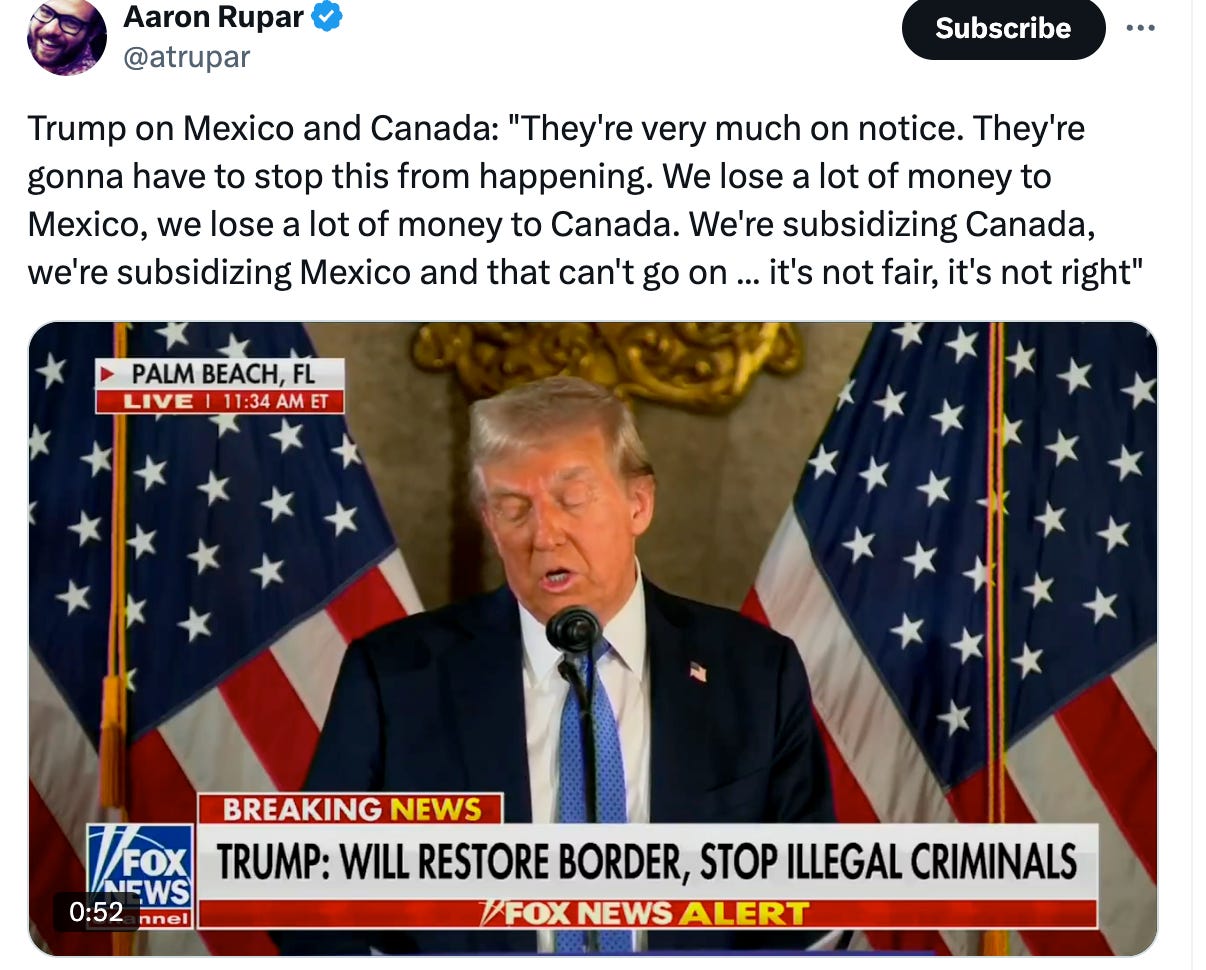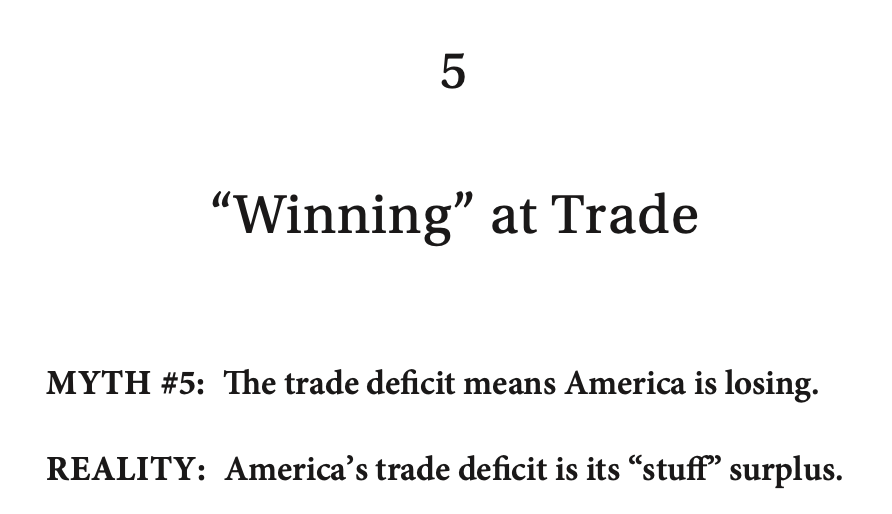Earlier today, President-elect Donald Trump returned to a familiar grievance: accusing our trading partners of financially ripping us off. Here’s part of what he said a few hours ago.
When it comes to understanding Trump’s trade grievance, it’s all about the Benjamins. He hates the idea of “losing money” to Mexico and Canada.
You might remember that this was a major theme when Trump ran for president the first time. He was convinced that NAFTA was a disaster—and in many ways it was— and he pledged to replace it with a trade arrangement that would protect America’s interests. A few years later, as president, Trump signed the United States-Mexico-Canada Agreement (USMCA) into law. Here’s how he celebrated the new and supposedly-very-much-improved trade deal:
[W]e just ended a nightmare known as NAFTA...And we now have a brand-new U.S.-Mexico-Canada Agreement. It’s a whole different ballgame, and it’s going to be…incredible for Michigan and for every place else in our country.
The USMCA is the fairest, most balanced, and beneficial trade agreement we have ever signed into law. It’s the best agreement we’ve ever made, and we have others coming. And, by the way, the China deal, two weeks ago, was just signed. And that’s going to bring $250 billion into our country…
We’re very grateful to be joined with — some special people came today: Ambassador Robert Lighthizer. Where’s Bob? What a job you’ve done. What a job. He did this deal. He did China. He did Japan. They all worked together. But fantastic job. He worked night and day to complete this outstanding agreement.
It was supposed to help us start “winning” at trade, but here we are being told once again that the U.S. is getting ripped off by Mexico, Canada, etc.
Who Are You Calling a “Loser”?
I wrote about Trump’s peculiar way of thinking about “winning” and “losing” at trade in my book The Deficit Myth. Here are the opening paragraphs to Chapter 5:
I remember watching Donald Trump battle his way through the Republican primary debates with my son, Bradley, who was just nine years old at the time. It was 2015, and Trump was blustering on about trade, complaining that countries like Mexico, China, and Japan were ripping us off and vowing to bring an end to the thievery if voters would put him in the White House. It became a central theme of his campaign: We are losing the trade war against foreigners. “We don’t win anymore,” Trump thundered during a 2015 primary debate in Cleveland, Ohio. “We don’t beat China in trade. We don’t beat Japan, with their millions and millions of cars coming into this country, in trade.” It’s a message that resonated with millions of Americans, especially in states like Ohio, Michigan, Pennsylvania, North Carolina, and Wisconsin, where many voters traced the hollowing out of their communities and the loss of good-paying jobs to import competition and rising trade deficits.
As president, Trump remained obsessed with the gap between imports and exports, that is, America’s trade deficit with the rest of the world. To him, the trade deficit is prima facie evidence that America is losing at trade. On the one hand, he sees the losses in monetary terms, tweeting, “The United States has been losing for many years, 600 to 800 Billion Dollars a year on Trade. With China, we lose 500 Billion Dollars. Sorry, we’re not going to be doing that anymore!” The problem, he seems to believe, is that foreigners are running off with our money. And when he looks at the real terms of trade—the actual goods that are being traded between Americans and foreigners—he again sees America getting the raw end of the trade deal. In exchange for the millions of cars Japan is sending us, Trump explained in August 2019, “We send them wheat, wheat. That’s not a good deal.”3 At that point, my son, Bradley, then thirteen, turned to me with a puzzled look and said, “So, the problem is that we take their cars and they only take our wheat? That would be like me giving Ian two of my low-value trading cards and getting ten of his high-value cards in exchange. I would be very happy with that deal!”
Viewed from this perspective, you could say that a country “wins” by maximizing its benefits (imports) and minimizing its costs (exports). But that would imply, counterintuitively, that America’s roughly $700 billion trade deficit is evidence that the United States is already winning at trade. Could this be right? Does Trump have it completely backward? Instead of using tariffs to wage a trade war aimed at reducing the volume of goods coming into the United States from China and elsewhere, should the US be trying to run even bigger trade deficits? Would that make us the undisputed global trade champion? As we’ll see below, it’s much more complicated than the simple black and white of winning and losing at trade.
If you read the rest of the chapter, you’ll discover that international trade is a huge and hugely complex issue, with consequential and sometimes brutal impacts on workers, developing countries, and our environment.
Still, Trump is missing the forest for the trees when he complains about the U.S. losing money to Canada and Mexico. Our trading partners aren’t getting money for nothing. It should be obvious, but apparently it isn’t.
Years ago, one of my graduate students put this video together for a class project. It makes the point pretty well.






IMO, that is a fabulous video - clear and concise!
I predict that Trump's tariffs will not be high enough to help U.S. workers much. It will be just high enough for MAGA PR value but otherwise will be ineffective. Tariffs that are set high enough to re-direct investment toward new plants in the U.S. will eat into profits and possibly start a trade war.
If so, Trumpian tariffs will be the worst of all worlds -- hurting consumers but not helping workers. That's typically "good enough for government work" in D.C. Stephanie reminds us of how marginal Trump's "deals" with China, Mexico and Canada were (compared to Trump's hype).
I suspect Trump's tariff talk may be so much hot air to bully other countries (without knowing yet to what end). His base will love watching this theatre on Fox news, but their actual economic condition won't improve much.